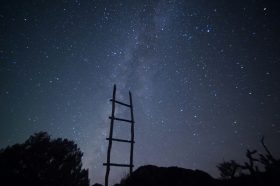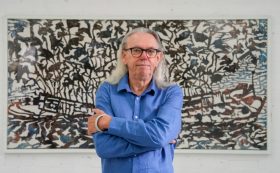It’s hard to believe that Australia didn’t have a creative business school – that is, until Compton School came along.
Founded by David Court in 2017, the Compton School was established to fulfill a dire need for structured guidance in creative arts businesses. Now, Australian creatives can get tailor-made insight into how arts businesses function, and how they can manage such a business themselves.
The Compton School is led by an experienced group of industry professionals known as Creative Fellows, and is open to anyone in the arts industry with a bit of experience under their belt. It offers carefully considered courses in leadership, finance, structures, strategy and decision-making – all through the lens of creative innovation.
Chloe Rickard, a screen producer and Compton Creative Fellow, said that teaching at Compton School gave her the chance to share her experience, both as an owner of a creative enterprise and as a filmmaker. ‘I can give industry insight as well as my own warts-and-all experience,’ she said.
‘I look forward to sharing my career musings with students, who I also learn a great deal from in the process. The circle of knowledge sharing is a highlight.’
What’s on offer
Compton School currently offers the following courses (which you can click on to find more about):
● Graduate Certificate in Creative Business 2022, mid-year entry (in partnership with the University of Canberra). Led by Dr David Court, this one year, part-time course includes mentorships with Compton’s Creative Fellows: Sue Maslin, Ian Murray, Dr Chris Stevens, Imogen Banks, Robert Connolly, Chloe Rickard, Vincent Sheehan and Piers Grove.
● Pitch-In: Creative Process and Pitching Workshops for Early Career Content Creators (in partnership with VicScreen)
● Advanced Creative Entrepreneurship (in partnership with UTS)
‘Creativity is both a very social and very practical endeavour,’ added Creative Fellow Dr Chris Stevens. ‘By exploring the science and psychology of creativity practitioners can focus their efforts on the factors that have been shown empirically to predict creative outcomes. Gone is the limited view of the solitary artist, to be replaced by people combining their creative knowledge and talents in an iterative process characterised by perseverance and collaborative skill.’
The Creative Fellows
David Court is a 40-year veteran of the arts. From being behind the financing of well-known Australian films Strictly Ballroom, The Wiggles Movie and The Animated Leunig, to heading up Screen Business at AFTRS, and now chairing Screen Canberra, Court certainly knows the industry inside and out.
But at the end of the day, teaching is his passion. ‘I came late to teaching,’ he said in an interview with ScreenHub. ‘But it’s probably the thing I’ve enjoyed doing most. And teaching at a film school, in particular, made me see that we could do more’.
Court noticed something was missing in the industry. Though the industry had naturally developed business structures, processes and approaches that improved the success rate of creative endeavours, nowhere had anyone attempted to capture that knowledge and use it to guide best practice.
‘Now, more than ever, business needs to innovate. To find new solutions to old problems, to create new ideas that have real commercial impact,’ Court said.
His solution: gather together a host of great creative minds who could impart their knowledge to the industry. Thus the Compton School’s Creative Fellows were formed.
‘What the creative arts industry shows us is that the creative process – the process of ideas being generated, selected and made – can be understood, managed and improved just like every other business process,’ he explained.
‘Since the main issue is that all this [business] wisdom is buried in process and practice, the solution is in excavating that wisdom. And the fastest way to do that is to invite senior people in the business into what we do.’
The Creative Fellows are:
- Piers Grove, publisher of Junkee Media, and founder of EnergyLab.
- Robert Connolly, producer and director of The Dry, Paper Planes, The Turning.
- Imogen Banks, founder of Kindling Pictures, and producer of Offspring, RFDS, The Beautiful Lie.
- Chloe Rickard, partner and Head of Production at Jungle, and producer of No Activity, Wakefield, Squinters.
- Sue Maslin AO, creative entrepreneur, and producer of the hit film The Dressmaker.
- Dr Chris Stevens, creative psychologist and entrepreneur.
- Vincent Sheehan, producer of Fisk, The Kettering Incident, Operation Buffalo.
- Ian Murray, founder of 113 Partners.
‘Sue Maslin has been with us from the start. And she’s an amazing woman with a great depth of knowledge and a great willingness to share,’ said Court.
‘Robert Connelly is both an innovator in the business and someone who is keen to guide the next generation. Chloe Rickard is an extraordinary force who could run the country. Piers Grove is just such an amazing mind.
‘We also have Chris Stevens, who’s a psychologist specialising in creative people and creative processes. And then we have people like Ian Murray, who’s a well-known financial advisor. We really have found the best people to bring to Compton students,’ Court said.
Being a fellow of the Compton School brings big benefits, too. By offering a flexible work structure, and a chance to stay connected to the industry (and its upcoming talents), being a tutor at Compton is ‘simple and pleasurable,’ Court explained. They’ve also captured a desire for industry professionals to ‘give back’ what they know, and nurture the next generation.
‘We know that the way people like to learn is to hear from people in the business who know the business, not just abstractly,’ Court added.
‘We don’t have a hundred years of academic knowledge to draw on – there’s maybe a handful of textbooks and they’re mostly out of date – which is why drawing from practitioners is essential.’
More businesslike
Court explained that there’s ‘a widely held perception [in the Australian screen industry] that we’re not particularly businesslike. Plus, the industry is so atomised that people working in it don’t get a chance to observe others up close and learn from them.
‘The whole idea of Compton School is that we know that knowledge is there, and now we’re just unearthing it,’ he said.
Key also to the exclusive teachings of the Compton School are its partnerships, primarily with the University of Canberra, which helped build the curriculum and will host the set course offerings, as well as those with a number of other notable institutions such as Create NSW and VicScreen.
Courses will be offered as a blend of in-person and online learning. ‘COVID taught us that undertaking a course via Zoom is not only possible, but in some cases preferred,’ said Court.
‘We’ve got students currently in Adelaide, Geelong, Melbourne, Sydney, Northern Rivers, and New Zealand – so there’s quite a distributed population of students, and Zoom solves that commute problem. It’s brilliant for the time poor, too,’ he continued.
‘All creative screen endeavours have a particular set of challenges around how you make the decision to start in the first place, how you build it, and how you finance it and distribute it. All of those things are different. Most businesses find their own way and then just do more of that. That’s not what we do. We’re accepting the challenge of making it new and adapting to industry change,’ Court said.
How to apply
For people interested in applying to the Compton School, applications will be open for the Graduate Certificate in Creative Business via the University of Canberra. It works like applying for any other tertiary course, and students will qualify for fee help. After completion of the certificate, students can then, if they wish, pursue the upcoming Masters course (yet to be announced).
If you’ve already got some knowledge and experience of the arts industry then this course may be the perfect addition to your resume.
‘We’re looking for people who have been in the industry for a few years and who now want to learn more about the business side,’ Court said. ‘They have to come wanting to build and grow a business.’
To find out more and apply for a Creative Business course, visit the Compton School website.





